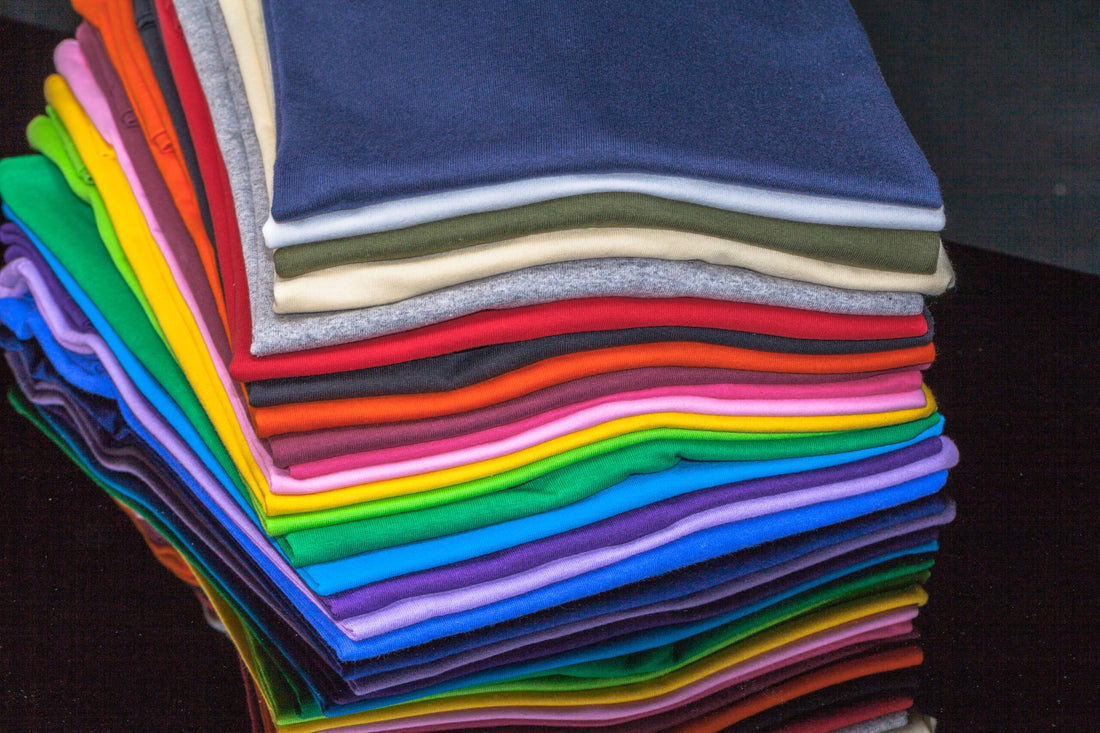
Screen Printing T-Shirts: Choosing the Best Fabric for Your Design
Share
When it comes to screen printing t-shirts, one of the most important decisions you'll make is choosing the right fabric. The fabric you select will affect the way your design looks and feels, as well as its durability and washability. In this article, we'll take a closer look at three popular options: 100% cotton, 100% polyester, and 50/50 blends. We'll explore the pros and cons of each and help you determine which fabric is the best choice for your screen printing project.
Introduction
Screen printing is a popular method for creating custom t-shirts, as well as other apparel and promotional products. It involves using a mesh screen to apply ink to the fabric, creating a design that can be as simple or complex as you'd like. While the design and ink colors you choose are important, the fabric you select is just as crucial to the success of your project.What is Screen Printing?
Before we dive into fabric choices, let's briefly explain the screen printing process. Screen printing is a technique where ink is pushed through a mesh stencil, or screen, onto fabric. The stencil is created by coating the screen with a light-sensitive emulsion and exposing it to a design, which creates a negative image. The emulsion hardens where the light hits it, creating a stencil that allows ink to pass through only where the design is intended. Once the screen is prepared, ink is poured onto it and pushed through using a squeegee. The ink is then dried and cured, typically through heat, to set the design onto the fabric. This process can be repeated with different screens to create multi-colored designs.Why Choosing the Right Fabric for Screen Printing T-Shirts Matters?
The fabric you choose for screen printing can have a big impact on the final product. The ink may appear differently on different fabrics, and some fabrics may not hold up as well over time. It's important to choose a fabric that works well with your design and will hold up to regular wear and washing.100% Cotton Fabric for Screen Printing T-Shirts
100% cotton is the most popular choice for screen printing, particularly for casual wear like t-shirts. Cotton is a natural fiber that is breathable, soft, and comfortable to wear.Pros of 100% Cotton Fabric
- Soft and comfortable: Cotton is a very soft and comfortable fabric, which makes it a great choice for apparel.
- Absorbent: Cotton is absorbent, which means it can absorb sweat and moisture, keeping you dry and cool.
- Breathable: Cotton is also a breathable fabric, allowing air to circulate and keeping you comfortable in warm weather.
- Eco-Friendly: Cotton is a renewable resource and biodegradable, making it a more environmentally-friendly choice.
Cons of 100% Cotton Fabric
- Shrinks: Cotton is known for shrinking when washed, which can cause problems if the garment is not pre-shrunk before printing.
- Wrinkles: Cotton is prone to wrinkling, which can affect the appearance of the printed design.
- Cotton can also fade over time, especially with frequent washing and exposure to sunlight.
- Less durable: 100% cotton may not be as durable as other fabrics and may wear out more quickly over time.
100% Polyester Fabric for Screen Printing
Polyester is a synthetic fabric that is known for its durability and wrinkle resistance. It is often used for sportswear and other athletic apparel, as well as for uniforms and workwear.Pros of 100% Polyester Fabric
- Durable: Polyester is a very strong and durable fabric that can withstand regular wear and tear.
- Wrinkle-resistant: Polyester does not wrinkle as easily as other fabrics, which makes it a good choice for travel or for garments that need to look neat and tidy.
- Colorfast: Polyester is resistant to fading, so colors will remain bright and vibrant even after multiple washes.
- Moisture-wicking: Polyester is moisture-wicking, which means it can pull sweat away from the body and keep you dry and comfortable.
Cons of 100% Polyester Fabric
- Less breathable: Polyester is not as breathable as cotton, so it may not be as comfortable to wear in hot weather.
- Can be uncomfortable: Some people find polyester to be uncomfortable against their skin, as it does not have the softness of cotton.
- Not eco-friendly: Polyester is a synthetic fabric that is not biodegradable and is made from petroleum products, so it is not as environmentally-friendly as natural fabrics like cotton.
50/50 Blend Fabric for Screen Printing T-Shirts
A 50/50 blend is a fabric that is made from equal parts cotton and polyester. This fabric combines the benefits of both cotton and polyester, creating a comfortable and durable option for screen printing.Pros of 50/50 Blend Fabric
- Comfortable: The cotton content in a 50/50 blend makes it soft and comfortable to wear.
- Durable: The polyester content in a 50/50 blend makes it strong and resistant to wear and tear.
- Moisture-wicking: The polyester in a 50/50 blend makes it moisture-wicking, which can help keep you dry and comfortable.
- Wrinkle-resistant: The polyester in a 50/50 blend makes it resistant to wrinkles and creases.
- Colorfast: A 50/50 blend is resistant to fading and can retain its color well over time.
Cons of 50/50 Blend Fabric
- May not be as breathable as 100% cotton.
- May not be as eco-friendly as 100% cotton.
Tri-blend fabric
Tri-blend fabric is a popular choice for screen printing t-shirts because it combines the best features of three different materials: cotton, polyester, and rayon. Typically, a tri-blend fabric is made up of 50% polyester, 25% cotton, and 25% rayon, although variations in the percentages are also common.Pros:
- Combines the best features of cotton, polyester, and rayon, making it a versatile option
- Soft, comfortable, and breathable, thanks to the cotton component
- Durable and moisture-wicking, thanks to the polyester component
- Has a subtle sheen and drape, thanks to the rayon component
- Can produce a unique and attractive result when screen printed properly
Cons:
- More expensive than other fabric options due to the combination of materials
- Can be more challenging to screen print on due to the blend of fibers affecting ink adhesion
- Care instructions may differ from those of cotton or polyester, requiring extra attention when washing or drying
Factors to Consider When Choosing Fabric
When choosing fabric for screen printing, there are a few key factors to consider:- Design: The type of fabric you choose can affect how the design appears. Some designs may look better on certain fabrics than others.
- Durability: Consider how often the garment will be worn and washed, and choose a fabric that can withstand regular use.
- Comfort: Think about the intended use of the garment and choose a fabric that is comfortable to wear.
- Environment: Consider the environmental impact of the fabric you choose and opt for a more eco-friendly option if possible.
Conclusion
Choosing the right fabric for your screen printing project can make all the difference in the final product. Whether you opt for 100% cotton, 100% polyester, or a 50/50 blend, each fabric has its own unique benefits and drawbacks. Consider the design, durability, comfort, and environmental impact when making your choice.FAQs
- What is the best fabric for screen printing t-shirts?
- The best fabric for screen printing t-shirts depends on the design, intended use, and personal preferences. 100% cotton, 100% polyester, and 50/50 blend fabrics all have their own unique benefits and drawbacks.
- Is 100% cotton better than polyester for screen printing?
- It depends on the specific project and personal preferences. Cotton is softer and more breathable, while polyester is more durable and wrinkle-resistant. Both fabrics can work well for screen printing, and a 50/50 blend may be a good compromise.
- Will screen printing fade over time?
- It depends on the quality of the printing and the fabric used. Proper care and washing can help prolong the life of the screen printing, but some fading may occur over time.
- Can you screen print on other fabrics besides cotton and polyester?
- Yes, it is possible to screen print on other fabrics such as silk, rayon, and nylon. However, the process and results may vary depending on the fabric.
- Is screen printing eco-friendly?
- It depends on the materials and processes used. Some inks and fabrics may be more eco-friendly than others, and choosing a more sustainable option can help reduce the environmental impact of screen printing.
